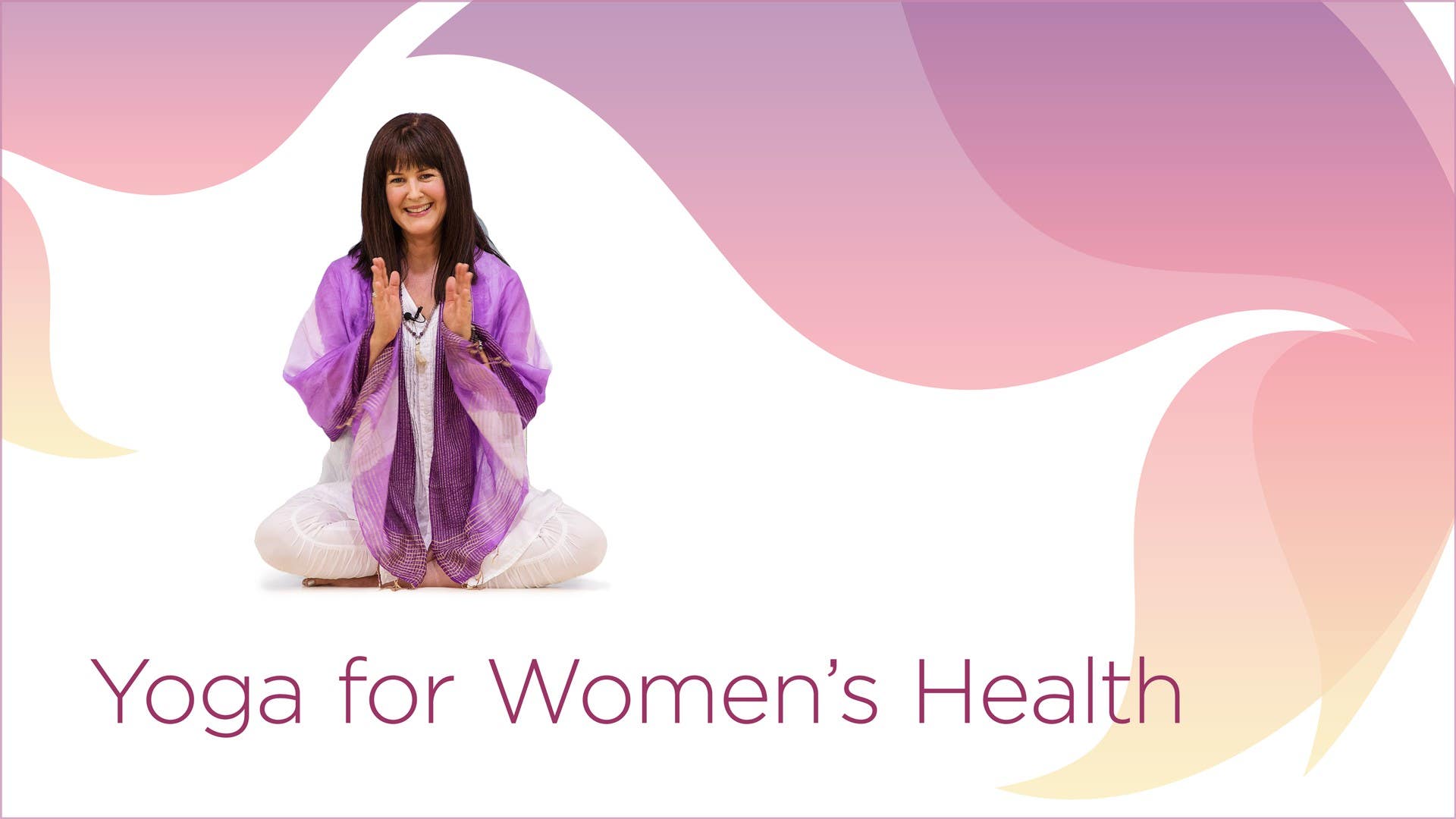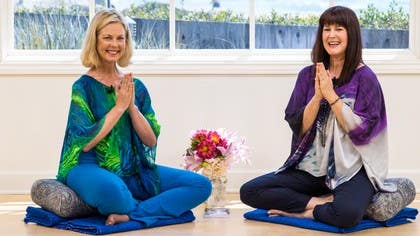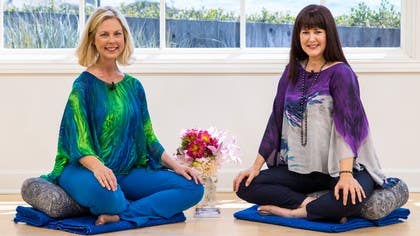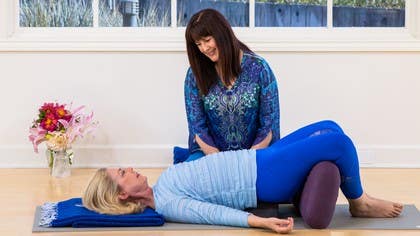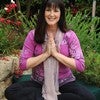Description
About This Video
Transcript
Read Full Transcript
(waves crashing) Welcome, and namaste. We're so glad you've joined us today for a conversation on perimenopause and menopause, both the joys and the challenges. And today, with me is Elizabeth Ann Robinson. Elizabeth, I'd love for you to start by telling everyone a little bit about your background. Sure.
I've been a nurse about 30 years, and a cardiac nurse mostly, and about midlife, I didn't have any children, and I needed a new challenge, and so I ended up going back to graduate school to do a doctorate, PhD, in mythological studies. And at the end of that research, I really needed to get really back in touch with my body again, and yoga was a big part of that. Can you also share a little bit about your journey with your body, with healing, and even menopause, your experience with heading into menopause? Yeah, well, you know, by this age, we've all been through our bumps, either illnesses or traumas or deaths of parents, and I certainly had that happen. My parents both died about 11 years ago, and I call that my cortisol years where my belly fat increased and my blood pressure went up a little bit, and had to do a lot of self-care during that time.
And then, about eight years ago when I met you, I had thyroid cancer, which is secondary to Hodgkin's disease, what I had when I was 16 years old. So sort of secondary cancer from the radiation therapy. But I met you doing restorative and therapeutic yoga. During that time, we became really good friends. But yeah, menopause for me, has probably been about that long so far.
It's seven to 14 years, and I'm about eight years into it, I'd say. But the ability of the body to rebound is just remarkable. You're such a beautiful example of that, and you have consistently kept up your yoga practice through everything that you've been through, through times of healing from surgery and working through writing your book. Your book, by the way, The Soul of the Nurse, it's a wonderful book about the mythology of nurses and the history of the nurse, and I highly recommend it. It's a great read, but I remember that was such also a stressful time, and when you were getting ready for your dissertation, you came to therapeutic yoga and said, "This is what I need." So I think it's really important to remember during the ups and downs of life, and especially through the perimenopausal periods, as your hormones start to change and your body starts to change, and then, through menopause where really menopause is the cessation of your menstrual periods, and it's usually after you've stopped your moon for about 12 months that you're considered in menopause, but leading up to that, it can be several years where there's all these fluctuations.
Your sleep may change, certainly your periods change. There can be heavy bleeding. There can be periods where you don't bleed. Both you and I had an interesting experience, too, where we didn't bleed for a year, and then, we started again, and I remember calling you up and saying, "What's going on?" You know, you had gone through it before me. So that's the other thing is it helps to have a friend to reach out to and talk to and say, "I'm having these symptoms," and to discuss these things with each other, to support each other through it.
I know in my life it wasn't discussed that much, like my grandmother and my mother. My mother used to have these really intense hot flashes, and I'd look at her. She had red hair, and her face would go bright red, and she'd say, "I'm hotter than a firecracker," (laughs), and I knew what it was. But she never really discussed it with me, and then, in her Alzheimer's, I didn't have a chance to actually ask her more about it and to know more because we can also find out a lot through the history of our parents, our mothers and grandmothers, and usually, we tend to go through it around the same time as they do, but for most women, it's around the age of 52. And there's lots of different things that can help.
Would you talk a little bit about some of the things that you know from the nursing perspective, too? Sure, sure. You know, I think the thing about menopause that is interesting and important to know is that it sneaks up on you. You don't really go into menopause one day. So you might have sleeplessness or, like you said, skipped periods or longer periods, irritability maybe, or the hot flashes, which, I know we've both experienced and shared.
You've watched me have 'em. I've watched you have 'em. Yes. (both women laugh) And it's just like a norm, and it's fun to be able to laugh about it with friends. I have to say, women love talking about our bodies. It's just a natural thing, but sometimes, we don't talk about specifics enough.
So for me, talking with other women and sharing the experience and not hiding it, not trying to be perfect and dry, but letting the hot flashes come. And I don't want to say like honoring them, but just, it just becomes a norm, and they change over time. Mine are much less intense these days. Yeah, I mean, I know there's hormone replacement therapy. I haven't chosen to do that.
It's a personal choice. There are a lot of different ideas around that, and as a cardiac nurse, we thought hormone replacement was the answer. In fact, my mother had been through menopause and never really talked about it, and then, at the time it was the thing. So her physician put her on hormones, and then, the study came out that there were some risks with that. So she went off of that.
Yeah, so I think what I've heard is that it's really important if you're doing either hormone replacement or bioidentical hormone replacement that you are monitored carefully for your levels, and that you really, have your self-care practices still in place. So you don't want to just think, "Well, this is gonna fix everything." You still want to take great care of yourself, do your yoga, your breath work, your meditation. So if you do choose that, and some women choose that because their symptoms are so intense, and it really helps them, and other women choose other ways. One of the things I'm working with is Chinese herbs, and that seems to be really a good way for me. Being a cancer survivor, I didn't feel comfortable, and I was at risk taking hormones.
So I chose not to, but I have to say, the yoga practice has been my go-to. One of the things I've been doing is putting my eye pillow in a plastic bag and sticking it in the freezer, and the minute I have a hot flash, I grab it, I go into my yoga space, and most of the positions I want to be in when I'm hot flashing is open where the air can kind of flow around me. But including a lot more forward bends in my regular practice, and then, you and I are walking buddies, too, which that whole aerobic thing is so important, too. Yeah, I think the thing, too, about menopausal years is the body shifting and changing, and we're always so hypercritical, I think, about our body and the extra belly fat and things aren't just what they used to be (laughs), and so, I think, shifting our idea of what's ideal rather than what's in commercials or on ads and really accepting our body. Having said that, knowing what I know about cardiology, it's important that your lipid panel is normal, that your BMI is under 25.
So I have a real allopathic approach to that, as well, and I was fine accepting my body as it changed, and I got older until my lipid panel got a little bit wonky and my BMI got a little bit high. So I really needed to get serious about losing a few pounds and starting a daily exercise practice, mostly of walking, and, of course, yoga. And that's done a, I mean, my labs are all normal now. So that's great for that part of me, yeah. Well, and I love hearing that, that we have the power to heal, to move into balance, and when we get a little out of balance, we gain some weight or we go through a difficult period.
I had an injury hiking and gained some weight because I couldn't continue my vigorous exercise, but the other thing that's really important to know, too, is that restorative yoga, because of how it was our stress levels, lowers our cortisol levels, and actually can help with belly fat. There have been studies that have proven that. So we think, "Oh, I don't want to do (mumbles), "and it's not important. "It's more important for me to work out "and stay really busy." With the perspective of Chinese medicine and the up of the (mumbles), the yin we need to nourish more, and that's more resting and sleeping more. I find one of the greatest things is getting to bed earlier.
My Chinese doctor said, "If you can get to bed before 11, "it's really helpful when you're going through some "of the more intense phase of your menopausal symptoms." So I've been doing that, but sometimes, if I'm really busy, I'm teaching a lot, I'll just come back and do one pose even. If I have time to do one pose, you know. Maybe I don't have time to do a full practice, but it also helps, like we have a regular walking date, and that helps to, you know, even though we're busy and sometimes we have to cancel, but when we're in town and when we're around, we commit to that time, and I think that's a good thing to do 'cause then you have that support of friendship and connection, and you can chat about everything. Walkin' and talkin'. Walk and talk, and then, it's the right and left stimulation of the body that also creates kind of a calming effect and releasing of mental stress.
So it's very helpful to walk and talk about sort of the things that we're working through. Yeah, I think, for me, the yoga and meditation and stress reduction is so key, and if I think back to my mother and her mother, they sort of had a lot of sort of free-floating anxiety. And they didn't have these tools. And so, I feel like I'm carrying on the next-generation of really honoring my body and taking care of my body instead of just pushing through like they did. I mean, they just pushed through and forged ahead, and they were pioneer women, and, you know, God bless them.
(both laugh) You know, right? But I really, really, really need the yoga and the restorative is just so key in deepening who I am as an individual, listening to my body. Everything comes from the body. Everything that's deep is held in the body. So beautifully said, yeah.
And the body wants us to listen, and we often can't listen if we're too busy. And it's in those moments of stillness and quietude that we can feel that speaking of the body, that communication from the deeper parts of ourselves. So I think it's so vital to have a meditation practice, and I think of restorative yoga, actually, as a meditation practice. It's just not the traditional wisdom, tradition meditation practice of seated meditation, but especially with how much time we spend sitting and that. I think it's important to release our back, and I know for me, as long as I don't go to sleep, if I'm staying conscious in my restorative pose, it can take me into a very deep place where my mind can really get quiet.
That also really helps with the mental fuzziness that comes with the changes in the hormones where you'll just forget what you were saying or things you black out. It's a strange change that happens with the fluctuation of hormones. And something funny, I mean, we all just kind of laugh at it. I mean, it's infuriating, right, but we end up laughing at it, and we understand. It's like an instant recognition when someone has that, "Oops, it's gone." Yeah.
And same thing with the hot flash. It's like, it kind of is funny when it's someone else, but when it's you, it really doesn't (laughs) feel that great. You have to do something like strip naked or get a fan right now. (both laugh) Talk about fans, I have to share my fan. I'm in love with my fan.
My fan, I got it at the drugstore, and you turn it on, and you can wear it around your neck. (Elizabeth laughs) And so, when I'm having a hot flash, this thing is my lifesaver. I love it, and I took it to my last teacher training. I was teaching, hoping I could wear it while I was lecturing, but it didn't really work (laughs). It's a laugh at that.
I have one under my desk at work. Yeah, yeah. And so, it's just great just to bend over, turn it on. It's like, "Ah." Yeah, so those things that can cool you down, and I also feel that when a hot flash is happening, it's kind of like being put on a train and it just takes off. No matter how you try to cool down, you still feel like you're being baked from the inside.
And sometimes, it's more intense than others where you'll pour sweat and have to take your clothes off, like you said, throw the covers off. And I find that rather than fighting it, I just get curious about it. Like, "What's happening here? "Where's the kundalini flowing?" And from the yoga perspective, it is a kundalini experience, and some of the wise women teachers talk about how it purifies the nervous system, it clears things from our nervous system so that we can then take our energy out into the world in a greater way. But a lot of things change around menopause for people, too.
They may go through divorce. They may go through really intense self-questioning about like, "What is my life about?" And moving out of the phase of the one that gives to everyone to what do I need now? What's important to me in my life? And that's where I think the yoga practice can be really beautiful, too, to bring us back to ourselves and to nourish and fill the well so that you can come back to meet the people in your life and your work and your creative expressions with more energy and clarity. I think the most wonderful thing about this phase of life is that there is no more BS.
I mean, we really are, I think, more truth tellers, more straight shooters, and relationship is primary for women. I mean, it really is, and this is a time where we can deepen into a relationship with ourselves, and, for me, too, with girlfriends. It's so important. But really taking the time for that relationship with the self is key, really key. Well, I am so grateful for our sisterhood and our friendship and all the wisdom that we've both garnered over the years in all the experiences that we've had.
Yeah. And so, we hold you all also at this time of change and transformation in your body and your heart, your mind, and wish you ease in this time. Namaste. Namaste. Namaste, sweet.
Yoga for Women's Health: Cheri Clampett
Comments
You need to be a subscriber to post a comment.
Please Log In or Create an Account to start your free trial.
